On June 21 and June 22, 2017, JBA, along with the Japanese Chamber of Commerce of Northern California (JCCNC) made their annual visit to the state capitol.
The annual visits have been held for 20 years and serve to maintain and strengthen relations with the state government and related organizations. Based on survey responses received from JBA and JCCNC members, topics such as changes in the state policy after the transition to the Trump administration, labor wages, corporate and governmental costs, subsidies from state governments, self-driving automobiles and environmental regulations, and state government initiatives on Infrastructure development, etc, were discussed.
In addition, the visiting delegation was received by the California Senate and engaged in discussions with the South Bay region’s sole Japanese-American Assembly member and Representative Mr. Al Muratsuchi. At the evening reception, the contributions of Japanese companies were discussed with various government officials In order to raise its appeal.
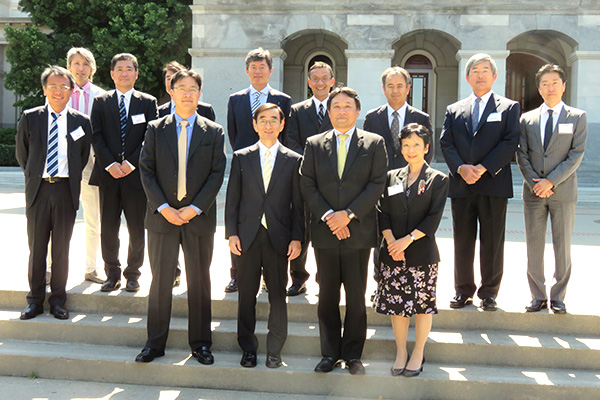 The JBA and JCCNC delegation in front of the California State Assembly
The JBA and JCCNC delegation in front of the California State Assembly
Itinerary of the Visit
Wednesday, June 21, 2017- Meeting with the California Seismic Safety Commission, California Business, Consumer Service and Housing Agency
- Lunch Meeting with the California Chamber of Commerce (CalChamber)
- Meeting with the Department of Motor Vehicles (DMV)
- Meeting with Assembly Member Al Muratsuchi
- Reception with California government, Senators, Assembly members, and executives
- Introduction by the California Senate
- Meeting with California Governor’s Office of Business and Economic Development (Go-Biz) and the California Environmental Protection Agency
- Meeting with Economic Development Chief Consultant Chris Dombrowski
Meeting with California Seismic Safety Commission, California Business, Consumer Services and Housing Agency
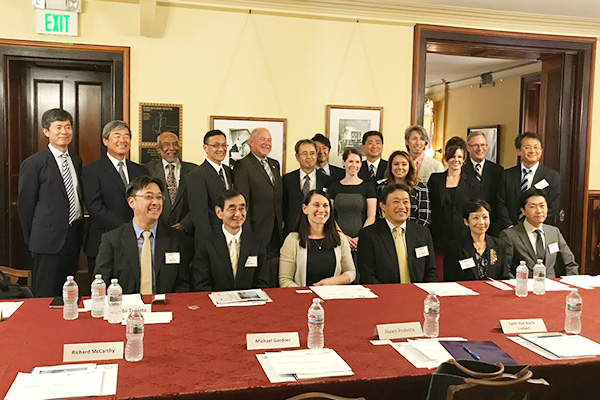 Front row, third from left: Alexis Podesta, Secretary, California Business, Consumer Services and Housing Agency
Front row, third from left: Alexis Podesta, Secretary, California Business, Consumer Services and Housing Agency
The California Business, Consumer Services and Housing Agency (BCSH) has a staff of approximately 5,000 supporting a wide range of services including license management, consumer protection, low-income housing, seismic activity, alcohol management, and human rights issues. The California Seismic Safety Commission is a department of BCSH responsible for state government response, disaster recovery, disaster prevention, and other related services in the case of disaster.
California has a relatively high probability of an earthquake occurring – for that reason, the state government is considering earthquake countermeasures and reconstruction strategies. However, since these are currently limited to public facilities and small to mid-size enterprises, there is much to be learned from Japan, a developed country concerned with disasters/reconstruction efforts. In addition, survey responses by JBA and JCCNC member companies were conducted in order to reflect the opinions of Japanese companies with high economic contribution in California State policy recommendations. JBA asked for formulation and clarification of post-disaster corporate support plans (especially for small and medium enterprises).
Meeting with the California Governor’s Office of Business and Economic Development (Go-Biz) and the California Environmental Protection Agency
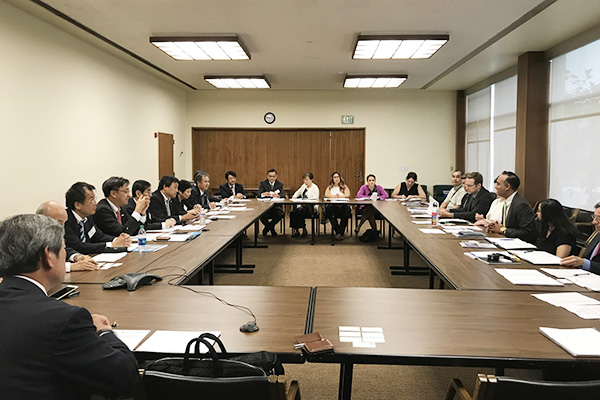 Joint meeting with 15 members of JBA and JCCNC and 12 members of Go-Biz and California Environmental Protection Agency
Joint meeting with 15 members of JBA and JCCNC and 12 members of Go-Biz and California Environmental Protection Agency
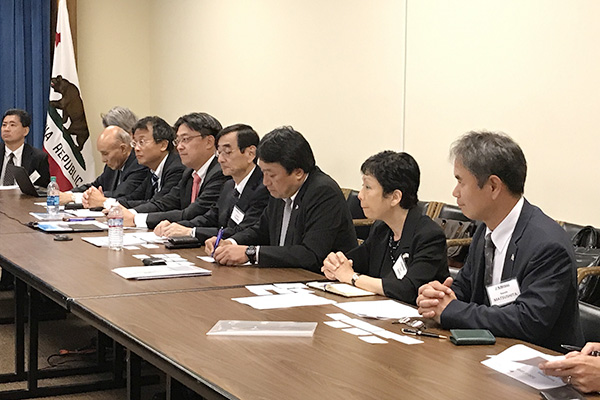 From the left: Matsushita, Chair of Business and Commerce Committee, Kaifu, Executive Vice President, and Ishikawa, President, JBA
From the left: Matsushita, Chair of Business and Commerce Committee, Kaifu, Executive Vice President, and Ishikawa, President, JBA
The Governor’s Office of Business and Economics Development (Go-Biz) is a state government special agency for economic promotion and employment creation in California. With the California Environmental Protection Agency also in attendance, the meeting confirmed the state government’s views on topics pre-sent based on JBA’s questionnaire to member companies. (For details, see below) The State highly appreciated the contribution of Japanese companies to the economy and employment of California, and encouraged questions and consulting on California Competes Tax Credit associated with labor regulation, state government approval and new hiring. The State encouraged questions and consultations, which would be given free of charge.
(Regarding permission and licensing regulations, Go-Biz is utilizing One Stop services in cooperation with County and City and highly encourage its use.)
Impact of Federal Government Changeover (especially in regards to environment)Governor Brown’s four main policies (Clean Energy, Clean Technology, Global Warming issues, and Environmental Sustainability) were unaffected by the change in federal government. The state government’s continuing environmental goals (such as the reduction of greenhouse gases) will remain as is stipulated by state governance ordinance of 2015 until the year 2030. In addition, there is a target of reaching 1.5 million Zero Emission Vehicles (ZEV) by the year 2025.
Rise in Business CostsDue to rising minimum wage, expensive rent, and living expenses, a few companies have moved their business out of the state of California. On the other hand, other companies are advancing into California through Go-Biz. In addition to the California Competes Tax Credit (tax deduction program), other incentive programs are highly encouraged for use. Go-Biz also provides support for existing companies as well as new companies, such as location selection, support for acquisition of licenses and licenses, and intermediaries for local governments.
Drought and Water ShortageThanks to the snowfall of the last season, as of April 2017, the snowfall amount is 164% of the normal average, and it is now recognized that the water shortage has been resolved. As a result of advances in drought response that began in 2014, 22% of water saving became possible. In order to accumulate water use and data management, a “water action plan” has been formulated.
Meeting with California Governor’s Office of Emergency Services (Cal OES)
Cal OES Director Abby Browning is responsible for contacting businesses, nonprofits, universities and communities in the event of a disaster as the Chief of Office Private Sector. In the event of an evacuation, the contact information for evacuation procedures and such will be under the jurisdiction of the county sheriff. As information is drawn out by Cal OES during times of disaster, it can be used as an information source or a place for consultation by local businesses from when disaster strikes to recovery. In addition, it was explained that Cal OES could provide statewide companies various types of training such as emergency management, public safety, and disaster recovery through the CA Specialized Training Institute, and that each company should constantly be prepared for these types of situations.
Meeting with the Department of Motor Vehicles (DMV)
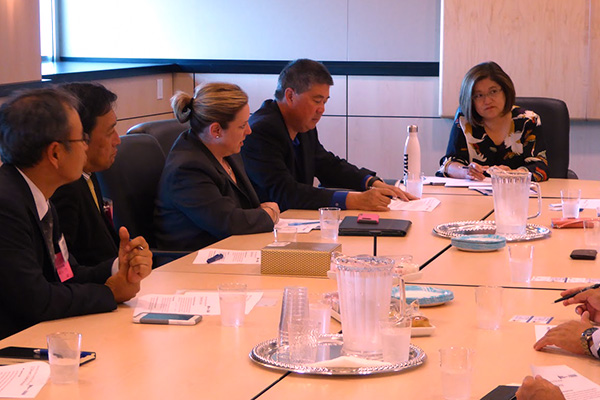 From the right: Jean Shiomoto, Director, Wesley Goo, Deputy Director, DMV
From the right: Jean Shiomoto, Director, Wesley Goo, Deputy Director, DMV
In a meeting with four DMV executives including Jean Shiomoto, Director, we gratefully acknowledged the individual responses for the inquiries issued by JBA members regarding driver’s licenses. In addition, in response to requests to shorten the period until a licenses is issued, it was explained that the reason for the delay in issuing a driver’s license for foreigners is due to the extensive examination by the Department of Homeland Security in their review of applications from the DMV. Regarding the expiration date of the license, it was explained that the application fee is based on five years with adjustments made depending on the I-94 visa and visa deadline. In other notices from the DMV, comments were made regarding improvements to laws on self-driving cars and starting a full-fledged process. Also, the possibility of installing a touch-panel type driver’s license test that will be available in more than 30 languages (including Japanese) was discussed.
Visit to the California Senate
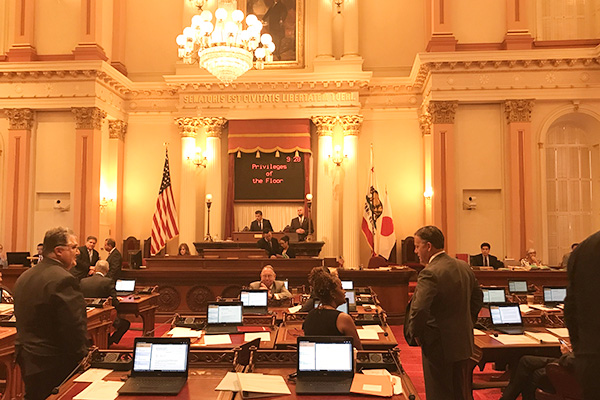 View of Congress. The Japanese flag was raised next to the Chairman’s seat
View of Congress. The Japanese flag was raised next to the Chairman’s seat
On Thursday, June 22, JBA and JCCNC visited the California Senate during a floor session. We received the honor of being introduced by Kevin de Leon to all Senators in attendance.
Japan is currently the largest investor to the state of California, with Japanese companies creating large employment bases within the state. A message was sent to further strengthen this relationship.
Other notes
In addition, we held a luncheon meeting with the executives of the California Chamber of Commerce and exchanged lively opinions on California’s economic and industrial trends. Based on the outcome of this year’s Sacramento visit, we will continue to work so that JBA member companies can enjoy more meaningful benefits and useful information.
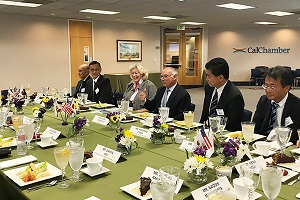 Luncheon meeting with the California Chamber of Commerce
Luncheon meeting with the California Chamber of CommerceThird from right: Allan Zaremberg, President and CEO of the California Chamber of Commerce
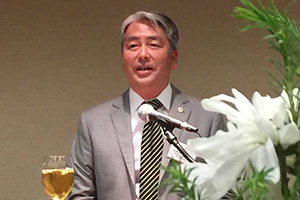 Assembly Member Al Muratsuchi (South Bay) gave a speech at the evening reception
Assembly Member Al Muratsuchi (South Bay) gave a speech at the evening reception
Currently, it is possible to be introduced to state officials should you have inquiries regarding California state licensing, tax deduction programs, and more. Please contact the Business and Commerce Committee via Yuji Takahashi, Executive Director of JBA for further details.

